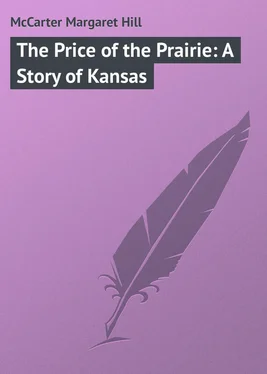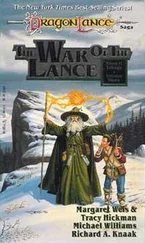Margaret McCarter - The Price of the Prairie - A Story of Kansas
Здесь есть возможность читать онлайн «Margaret McCarter - The Price of the Prairie - A Story of Kansas» — ознакомительный отрывок электронной книги совершенно бесплатно, а после прочтения отрывка купить полную версию. В некоторых случаях можно слушать аудио, скачать через торрент в формате fb2 и присутствует краткое содержание. Жанр: foreign_prose, foreign_adventure, на английском языке. Описание произведения, (предисловие) а так же отзывы посетителей доступны на портале библиотеки ЛибКат.
- Название:The Price of the Prairie: A Story of Kansas
- Автор:
- Жанр:
- Год:неизвестен
- ISBN:нет данных
- Рейтинг книги:3 / 5. Голосов: 1
-
Избранное:Добавить в избранное
- Отзывы:
-
Ваша оценка:
- 60
- 1
- 2
- 3
- 4
- 5
The Price of the Prairie: A Story of Kansas: краткое содержание, описание и аннотация
Предлагаем к чтению аннотацию, описание, краткое содержание или предисловие (зависит от того, что написал сам автор книги «The Price of the Prairie: A Story of Kansas»). Если вы не нашли необходимую информацию о книге — напишите в комментариях, мы постараемся отыскать её.
The Price of the Prairie: A Story of Kansas — читать онлайн ознакомительный отрывок
Ниже представлен текст книги, разбитый по страницам. Система сохранения места последней прочитанной страницы, позволяет с удобством читать онлайн бесплатно книгу «The Price of the Prairie: A Story of Kansas», без необходимости каждый раз заново искать на чём Вы остановились. Поставьте закладку, и сможете в любой момент перейти на страницу, на которой закончили чтение.
Интервал:
Закладка:
On the day that Kansas became a Territory, my father, John Baronet, with all his household effects started from Rockport, Massachusetts, to begin life anew in the wild unknown West. He was not a poor man, heaven bless his memory! He never knew want except the pinch of pioneer life when money is of no avail because the necessities are out of reach. In the East he had been a successful lawyer and his success followed him. They will tell you in Springvale to-day that "if Judge Baronet were alive and on the bench things would go vastly better," and much more to like effect.
My mother was young and beautiful, and to her the world was full of beauty. Especially did she love the sea. All her life was spent beside it, and it was ever her delight. It must have been from her that my own love of nature came as a heritage to me, giving me capacity to take and keep those prairie scenes of idyllic beauty that fill my memory now.
In the Summer of 1853 my father's maiden sister Candace had come to live with us. Candace Baronet was the living refutation of all the unkind criticism ever heaped upon old maids. She was a strong, comely, unselfish woman who lived where the best thoughts grow.
One day in late October, a sudden squall drove landward, capsizing the dory in which my mother was returning from a visit to old friends on an island off the Rockport coast. She was in sight of home when that furious gust of wind and rain swept across her path. The next morning the little waves rippled musically against the beach whither they had borne my dead mother and left her without one mark of cruel usage. Neither was there any sign of terror on her face, white and peaceful under her damp dark hair.
I know now that my father and his sister tried hard to suppress their sorrow for my sake, but the curtains on the seaward side of the house were always lowered now and my father's face looked more and more to the westward. The sea became an unbearable thing to him. Yet he was a brave, unselfish man and in all the years following that one Winter he lived cheerfully and nobly – a sunshiny life.
In the early Spring he gave up his law practice in Rockport.
"The place for me is on the frontier," he said to my Aunt Candace one day. "I'm sick of the sight of that water. I want to try the prairies and I want to be in the struggle that is beginning beyond the Missouri. I want to do one man's part in the making of the West."
Aunt Candace looked steadily into her brother's face.
"I am sick of the sea, too, John," she said. "Will the prairies be kinder to us, I wonder."
I did not know till long afterward, when the Kansas blue-grass had covered both their graves, that the blue Atlantic had in its keeping the form of the one love of my aunt's life. Rich am I, Philip Baronet, to have had such a father and such a mother-hearted aunt. They made life full and happy for me with never from that day any doleful grieving over the portion Providence had given them. And the blessed prairie did bring them peace. Its spell was like a benediction on their lives who lived to bless many lives.
It was late June when our covered wagon and tired ox-team stopped on the east bluff above the Neosho just outside of Springvale. The sun was dropping behind the prairie far across the river valley when another wagon and ox-team with pioneers like ourselves joined us. They were Irving Whately and his wife and little daughter, Marjory. I was only seven and I have forgotten many things of these later years, but I'll never forget Marjie as I first saw her. She was stiff from long sitting in the big covered wagon, and she stretched her pudgy little legs to get the cramp out of them, as she took in the scene. Her pink sun-bonnet had fallen back and she was holding it by both strings in one hand. Her rough brown hair was all in little blowsy ringlets round her face and the two braids hanging in front of her shoulders ended each in a big blowsy curl. Her eyes were as brown as her hair. But what I noted then and many a time afterward was the exceeding whiteness of her face. From St. Louis I had seen nothing but dark-skinned Mexicans, tanned Missourians, and Indian, Creole, and French Canadian, all coppery or bronze brown, in this land of glaring sunshine. Marjie made me think of Rockport and the pink-cheeked children of the country lanes about the town. But most of all she called my mother back, white and beautiful as she looked in her last peaceful sleep, the day the sea gave her to us again. "Star Face," Jean Pahusca used to call Marjie, for even in the Kansas heat and browning winds she never lost the pink tint no miniature painting on ivory could exaggerate.
We stood looking at one another in the purple twilight.
"What's your name?"
"Marjory Whately. What's yours?"
"Phil Baronet, and I'm seven years old." This, a shade boastingly.
"I'm six," Marjory said. "Are you afraid of Indians?"
"No," I declared. "I won't let the Indians hurt you. Let's run a race," pointing toward where the Neosho lay glistening in the last light of day, a gap in the bluff letting the reflection from great golden clouds illumine its wave-crumpled surface.
We took hold of hands and started down the long slope together, but our parents called us back. "Playmates already," I heard them saying.
In the gathering evening shadows we all lumbered down the slope to the rock-bottomed ford and up into the little hamlet of Springvale.
That night when I said my prayers to Aunt Candace I cried softly on her shoulder. "Marjie makes me homesick," I sobbed, and Aunt Candace understood then and always afterward.
The very air about Springvale was full of tradition. The town had been from the earliest times a landmark of the old Santa Fé trail. When the freighters and plainsmen left the village and climbed to the top of the slope and set their faces to the west there lay before them only the wilderness wastes. Here Nature, grown miserly, offered not even a stick of timber to mend a broken cart-pole in all the thousand miles between the Neosho and the Spanish settlement of New Mexico.
Here the Indians came with their furs and beaded garments to exchange for firearms and fire-water. People fastened their doors at night for a purpose. No curfew bell was needed to call in the children. The wooded Neosho Valley grew dark before the evening lights had left the prairies beyond the west bluff, and the waters that sang all day a song of cheer as they rippled over the rocky river bed seemed always after nightfall to gurgle murderously as they went their way down the black-shadowed valley.
The main street was as broad as an Eastern boulevard. Space counted for nothing in planning towns in a land made up of distances. At the end of this street stood the "Last Chance" general store, the outpost of civilization. What the freighter failed to get here he would do without until he stood inside the brown adobe walls of the old city of Santa Fé. Tell Mapleson, the proprietor of the "Last Chance," was a tall, slight, restless man, quick-witted, with somewhat polished manners and a gift of persuasion in his speech.
Near this store was Conlow's blacksmith shop, where the low-browed, black-eyed Conlow family have shod horses and mended wagons since anybody can remember. They were the kind of people one instinctively does not trust, and yet nobody could find a true bill against them. The shop had thick stone walls. High up under the eaves on the north side a long narrow slit, where a stone was missing, let out a bar of sullen red light. Old Conlow did not know about that chink for years, for it was only from the bluff above the town that the light could be seen.
Our advent in Springvale was just at the time of its transition from a plains trading-post to a Territorial town with ambition for settlement and civilization. I can see now that John Baronet deserved the place he came to hold in that frontier community, for he was a State-builder.
Читать дальшеИнтервал:
Закладка:
Похожие книги на «The Price of the Prairie: A Story of Kansas»
Представляем Вашему вниманию похожие книги на «The Price of the Prairie: A Story of Kansas» списком для выбора. Мы отобрали схожую по названию и смыслу литературу в надежде предоставить читателям больше вариантов отыскать новые, интересные, ещё непрочитанные произведения.
Обсуждение, отзывы о книге «The Price of the Prairie: A Story of Kansas» и просто собственные мнения читателей. Оставьте ваши комментарии, напишите, что Вы думаете о произведении, его смысле или главных героях. Укажите что конкретно понравилось, а что нет, и почему Вы так считаете.












